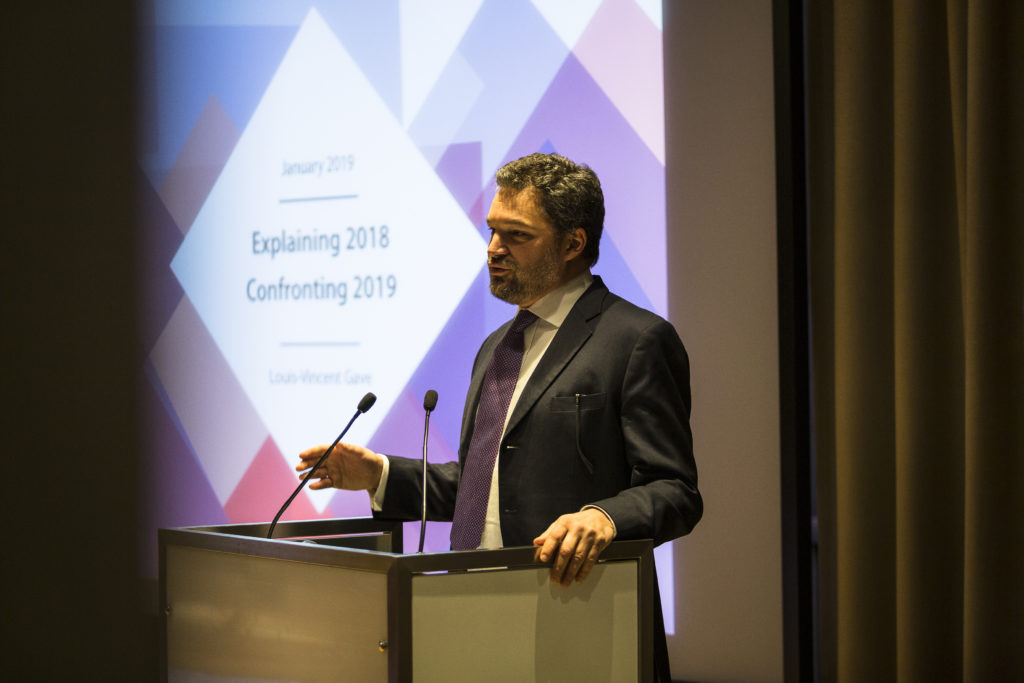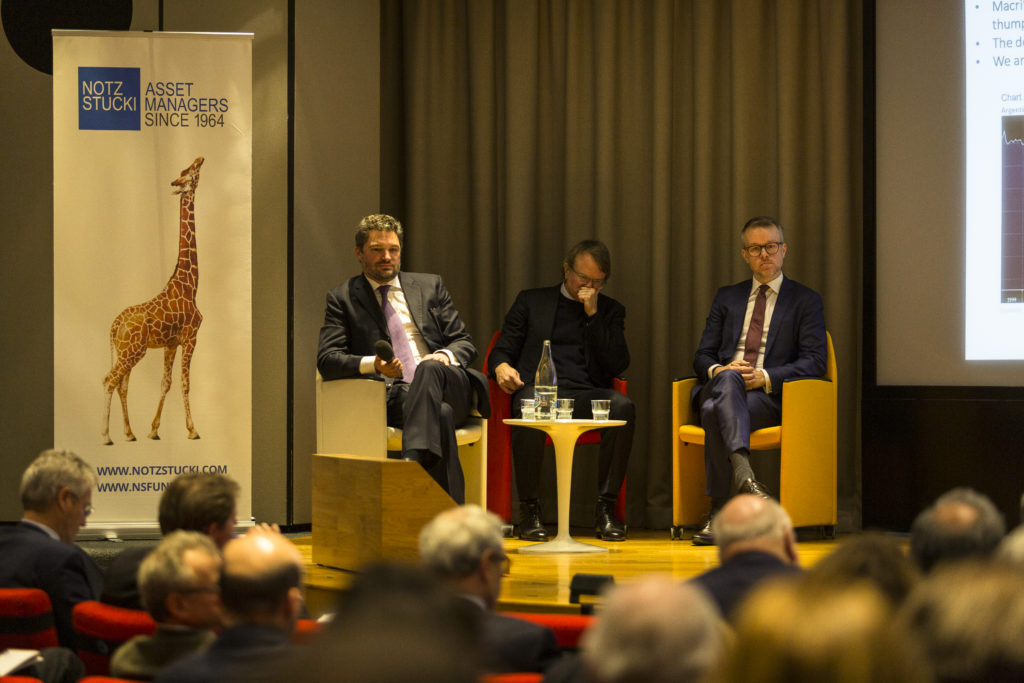Notz Stucki Investment Conference – January 8th 2019
2018 was an ugly year in financial markets with every major asset class falling. Equities were the worst performer, but even US Treasuries fell. Only US cash showed any return. Our meeting reviewed some of the causes of this poor result, and also the outlook for 2019.
The principle reason was that there were lots of demands on liquidity last year, that sucked cash out of financial assets. Interest rate rises were one of these pulls. Another was the Federal Reserve shrinking its balance sheet, a process that had reached a level of $50bn a month by the final quarter. On top of all this the US budget deficit is expanding steadily and is projected to reach 5% of GDP in a few years. The budget deficit is of particular concern as it is expanding despite robust growth and low unemployment. Expanding budget deficits are commonly associated with recessions when governments try to offset contracting growth. Worse the ageing of the US population mean that the deficit has a structural character as pension and medical demands mount up. Europe faced a similar demographic profile twenty years ago and solved it by cutting its military budget. The US is unlikely to do the same. Current projections for the US budget deficit are based on resilient future economic growth. Lurking in investors’ minds is the uneasy question of what would happen to the deficit if US growth slipped. It may be for this reason that the US dollar was not even stronger last year, when almost every factor was in its favour – vide hawkish Fed, US growth better than elsewhere, imploding EM and Italian dramas.

After such a gloomy year it is natural for investors to worry about the most fragile parts of the system. The main candidates that are mentioned in this context are the likes of the Italian bond market, Deutsche Bank, and China. However a prime concern of Gavekal is the US corporate bond market. The last few years have seen a massive issuance of corporate debt. Much of this has been used for financial engineering not investment. Share buybacks by US companies represented the largest buyer of US equities last year – $750 billion in all of which $200bn was in the last quarter – and still the market went down. US corporate debt relative to GDP is at levels usually associated with recessions. Within the debt structure the lowest level of Investment Grade is BBB and there is a danger that some of this could be downgraded to junk status. A particularly interesting sector at the moment is energy. The sharp fall in oil in the last few months is positive for global growth, but not necessarily for US industrial production. The shale revolution has been a substantial part of US capex in the last decade, and much of that capex has been financed in the bond market. It is not a coincidence that the oil price plunge has been matched by a spike in the yield of high yield corporate bonds. In contrast to the old days a higher oil price is now helpful to US growth and many corporate bonds.
The other major change that was revealed in 2018 was in US China relations. For twenty years the international community has been striving to integrate China, and Chinese production has become intimately woven into the global supply chain. This process abruptly stopped last year, and is being replaced by something akin to a new Cold War. The difference to the old Cold War with the Soviet Union is that the Soviet Empire was economically separate from the West. By contrast China really matters both by virtue of its size and relationships. Apple is a good example of this. Perhaps no company has benefited more from being able to produce parts and assemble them in low cost China, and then sell the value added whole globally, with China itself being one of the largest markets.
The US China dispute is a major concern. What many in the West underestimate is China’s resolve to transform itself into a global trading superpower, building commercial routes that ensure the supply of hard and soft commodities, and access to export markets for them to send their finished goods. Xi Jinping is different from previous Chinese leaders in having what amounts to an Imperialist strategy. It is a direct challenge to the US hegemony. Another aspect of this challenge is China’s attempt to present the RMB as an alternative to the USD. China is trying to de-dollarise commodity markets. 12% of oil market futures are now priced in renminbi compared to nothing a year ago. If this trend continues there will be less need for countries to save in dollars, which they need to buy commodities, currently priced in US dollars. Control of the reserve currency has allowed the US to run its twin deficits. If this ends the US will have lost a huge advantage. As such China may have made a mistake by being so brazen in its confrontation with the US. This is the significance of the arrest of the CFO of Huawei in December, as in 2018 Huawei overtook Ericsson as the top telecom vendor in the world (and ZTE is the fourth largest now, another Chinese company that the US attacked). China seems to have miscalculated and overplayed its hand. One casualty will be the semiconductor industry. As a matter of national security China is pouring money into Chinese production to ensure they are no longer dependent on the US for these products. Consequently profits for the whole industry will evaporate because there will be no pricing discipline and significant new supply.
2018 marked a significant change because the forces of populism made politics much more uncertain, and the tensions between the US and China broke the surface. There was also further evidence that China’s tremendous growth rate is decelerating. Equities were hardly in a bubble before 2018 but valuations fell a lot last year throwing up some real value. For example, some UK equities and corporate bonds sold off dramatically even though the companies appear to be little effected by Brexit in any outcome of the negotiations. Some sectors that have worked well recently are facing more pressures, like technology and the FANGS, but the world does not look like it is heading into recession so for the patient stock picker there is abundant opportunity.
Through their presentations, our guest speakers offered a concise and readily applicable overview of the recent developments in financial markets.

Please here to access the speakers’ presentations.